
The COVID-19 pandemic has brought
an unprecedented disruption to the global economy and world trade, with
production and consumption scaling back across the globe. Most of the
affected countries were under lockdown and Malaysia was no exception.
Malaysia, however, was fortunate to be able to enter the “recovery phase” at
a rate of knots after the government introduced the Movement Control Order
(MCO) in March. Regardless of the situation, Malaysia had continued with its
investments and businesses post COVID-19. To further sift through this
matter, a webinar titled “In the New Transformation Era - Malaysia, Your
Next Destination” was jointly organised by China-ASEAN Business Association
(CABA) and UTAR on 30 June 2020 via
Zoom.
Speaking at the webinar was
Managing Partner of Reanda LLKG-cum-CEO of K-Konsult Taxation Sdn Bhd Koong
Lin Loong JP, ANS. Koong is also currently the national council member of
the Associated Chinese Chambers of Commerce and Industry of Malaysia
(ACCCIM), the chairman of ACCCIM SMEs Committee and the head of Taxation
Taskforce. The webinar was moderated by UTAR Institute of Management and
Leadership Development (IMLD) Director Prof Dr Cheng Ming Yu.
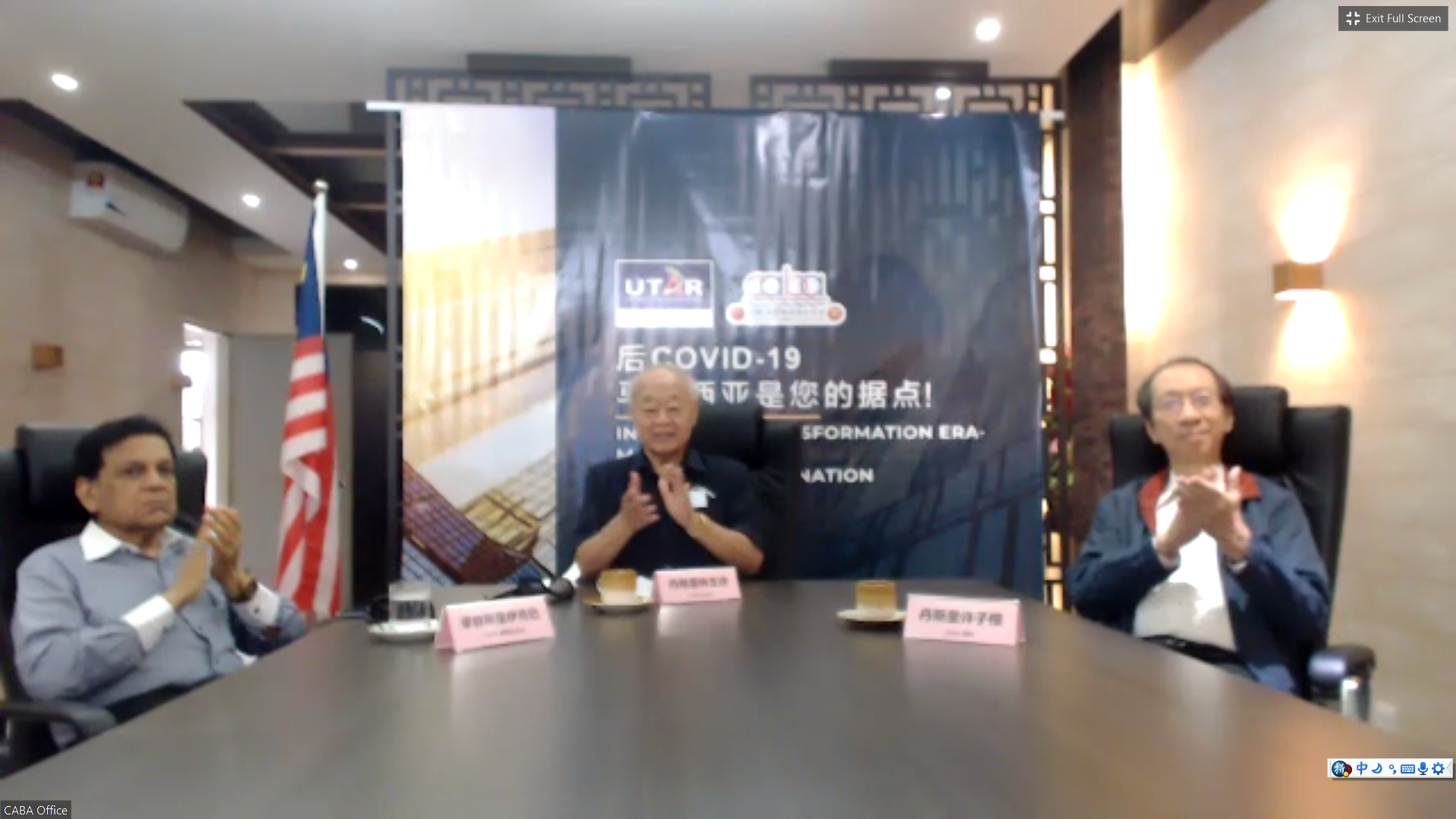
CABA President Tan
Sri Lim (centre) welcoming the participants to CABA-UTAR webinar series
Welcoming the participants to the
CABA-UTAR webinar series, CABA President Tan Sri Dato’ Seri Lim Gait Tong
said, “I would like to thank all the participants for joining us this
evening and also I would like to express my warmest gratitude to UTAR
President Ir Prof Dr Ewe Hong Tat and UTAR IMLD Director Prof Cheng for
putting the effort in organising the CABA-UTAR webinar series.”
“Since the occurrence of COVID-19
pandemic, the world economy had been very depressing. According to our
statistic in May, the trade volume has decreased by 27.8% and our export has
come to the lowest point in 11 years. The statistic also showed that the
China-ASEAN bilateral trade volume has slightly increased to 240 billion
USD. ASEAN is still the largest trading partner for China and we can see
that ASEAN is better than the US and other European countries” he said.
He added, “Today we are very
honoured to have Koong Lin Loong JP, ANS to be our speaker. He will share
with us a clear analysis of the post-COVID 19 pandemic economies and how we
can bring Malaysia’s economy to a better situation after the pandemic. I
hope all the online participants will be able to learn something from this
webinar,” he added.
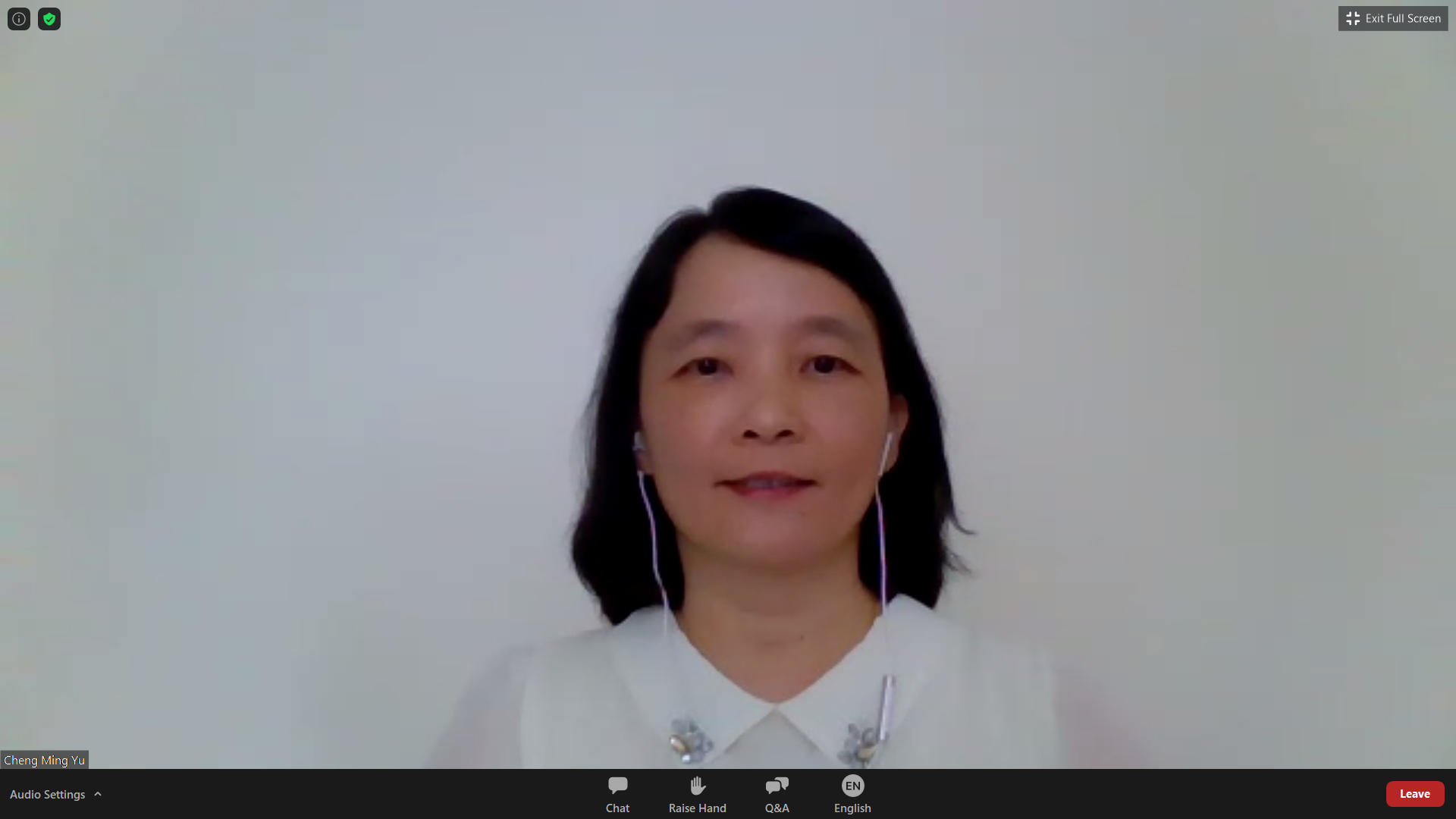
Prof Cheng
introducing the topic and speaker
Prof Cheng said, “In 2020, the
COVID-19 has created a big impact on our country and our government. The MCO
started on 18 March 2020 and now we are moving to the “recovery” stage.
Malaysia had been affected seriously due to this pandemic but we can still
see great macroeconomic opportunity in Malaysia. On the matter of how are we
going to see this as an advantage, let us hear it from our speaker.”
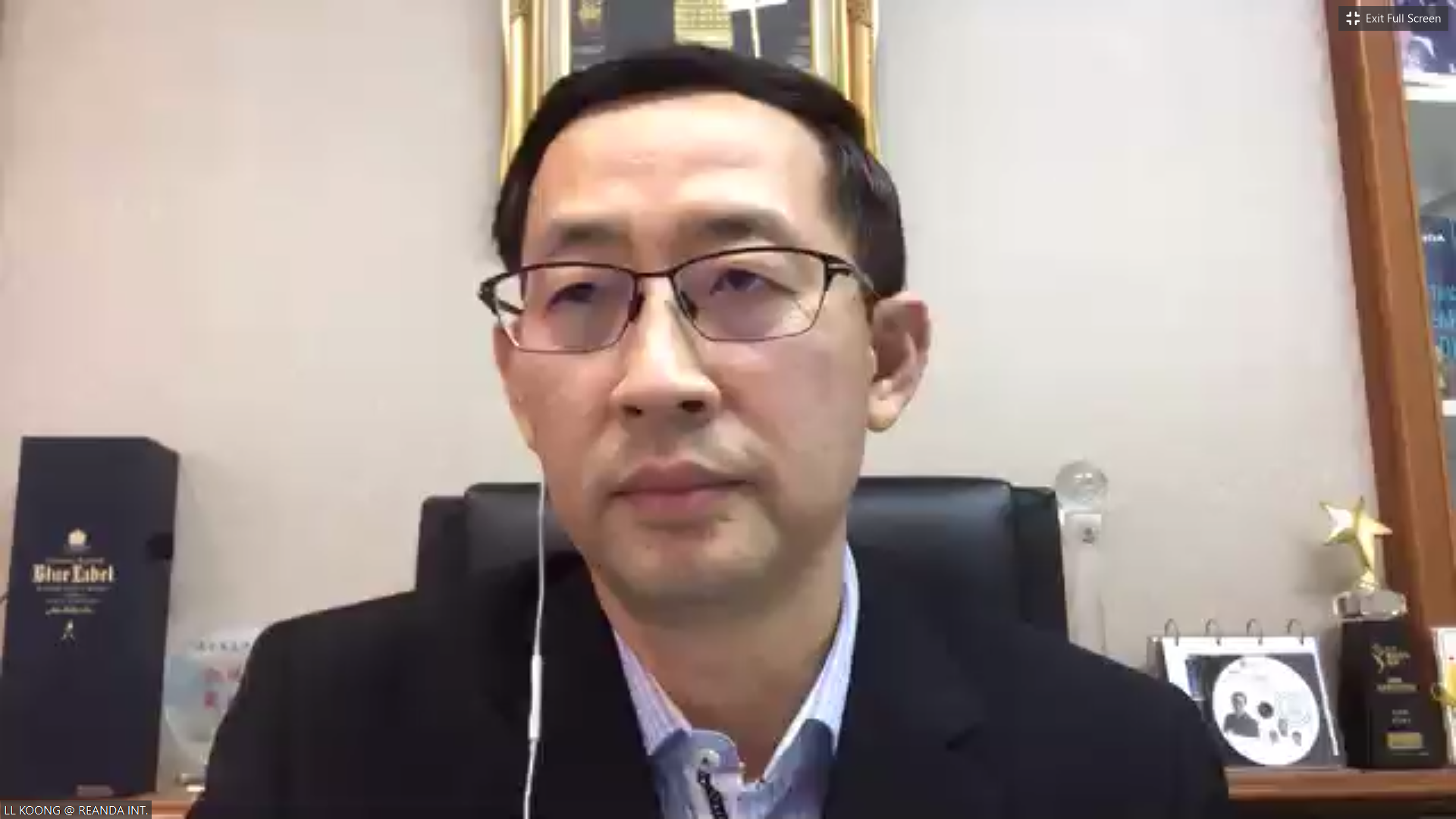
Kong during the
webinar
Kong’s
sharing was divided into two parts; he presented the “World’s Economic Hub
from the West to the East” for the first part and “Invest in
Malaysia: What You Should Know?” for the second part. He spoke about how the
economy affected the businesses, the free trade agreement between ASEAN &
China, Malaysia as a competitive principal hub location for ASEAN and
company’s structure & taxation.
He said, “The economy is now
actively moving from the west to the east. In the last century, the economy
was heavily focused on the west and the biggest economic entity was America,
followed by China is the second place. In the last century, people were
talking about the west economy, but now, people are talking about the east
economy. China was able to counter America because of the trade war between
China and the US and all of our businesses now are cross border.”
“I would suggest you to read “The
World Is Flat” by Thomas L. Friedman. This book briefly explains the history
of 21st century and analyses globalisation. I do agree that the
world is flat. In my personal opinion, the economy was slanting a little to
the west in the last century, but now it is slanting to the east. The
economies in the east are rising, and in our land, we are able to see that
the economy of South-East Asia is improving,” Kong said.
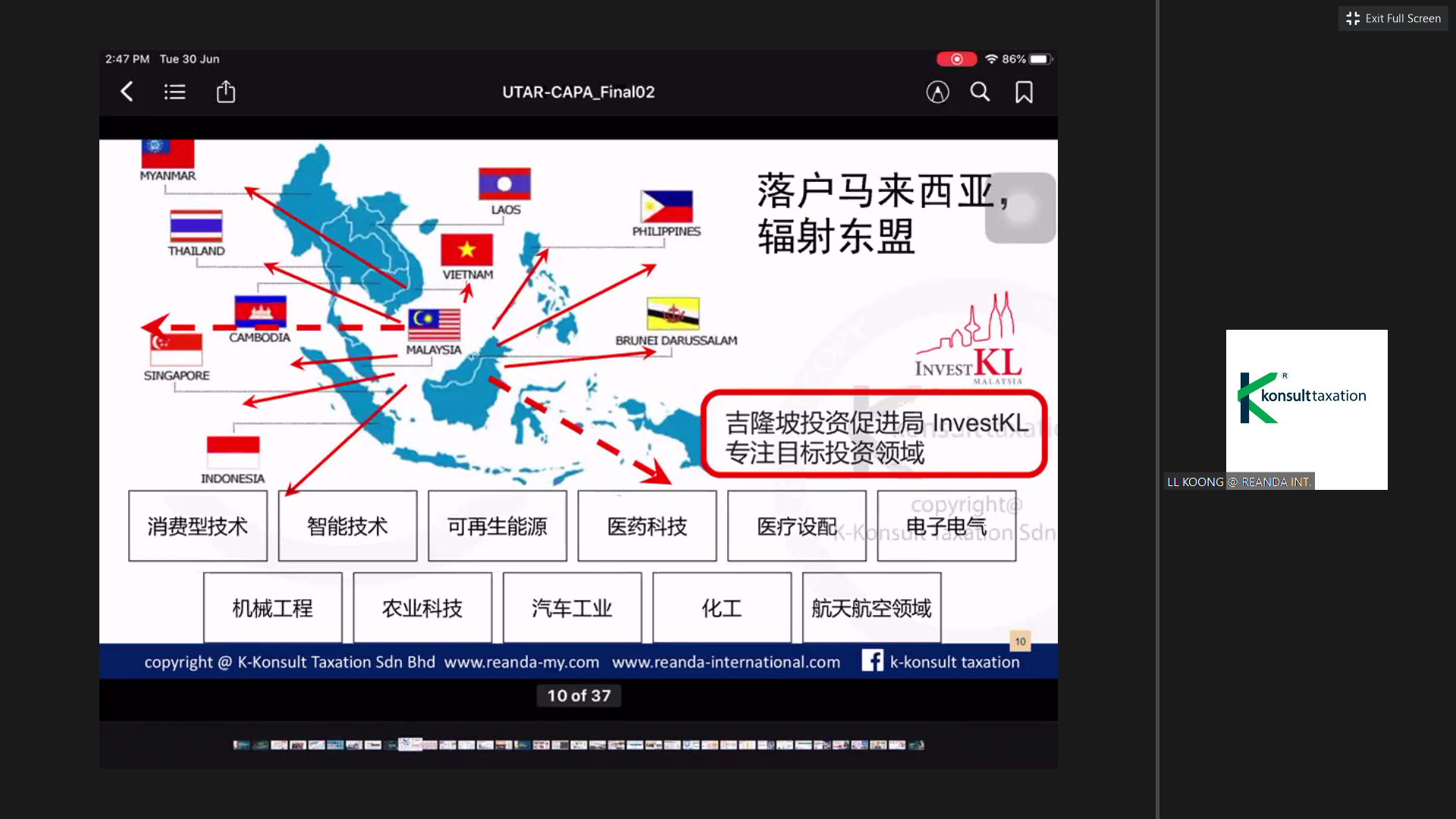
The location of
Malaysia is strategic hence it became the best investment location
Sharing on why Malaysia is able to
attract investors, Kong said, “We have the upper part of ASEAN which include
Cambodia, Thailand, Laos, Myanmar and Vietnam. These are called the Mekong
river economy; while the lower part of ASEAN consists of Malaysia,
Singapore, Indonesia, Brunei and the Philippines. Malaysia offers the most
strategic location as it is situated in the centre between the upper ASEAN
and the lower ASEAN, this makes Malaysia the best investment location. Based
on a research by InvestKL, the 11 industries that have advantages of
investing in Malaysia include consumer technology, intelligent technology,
renewable energy, pharmaceutical technology, medical equipment, electronic
and electrical, mechanical engineering, agricultural science and technology,
automobile, chemical and aerospace.”

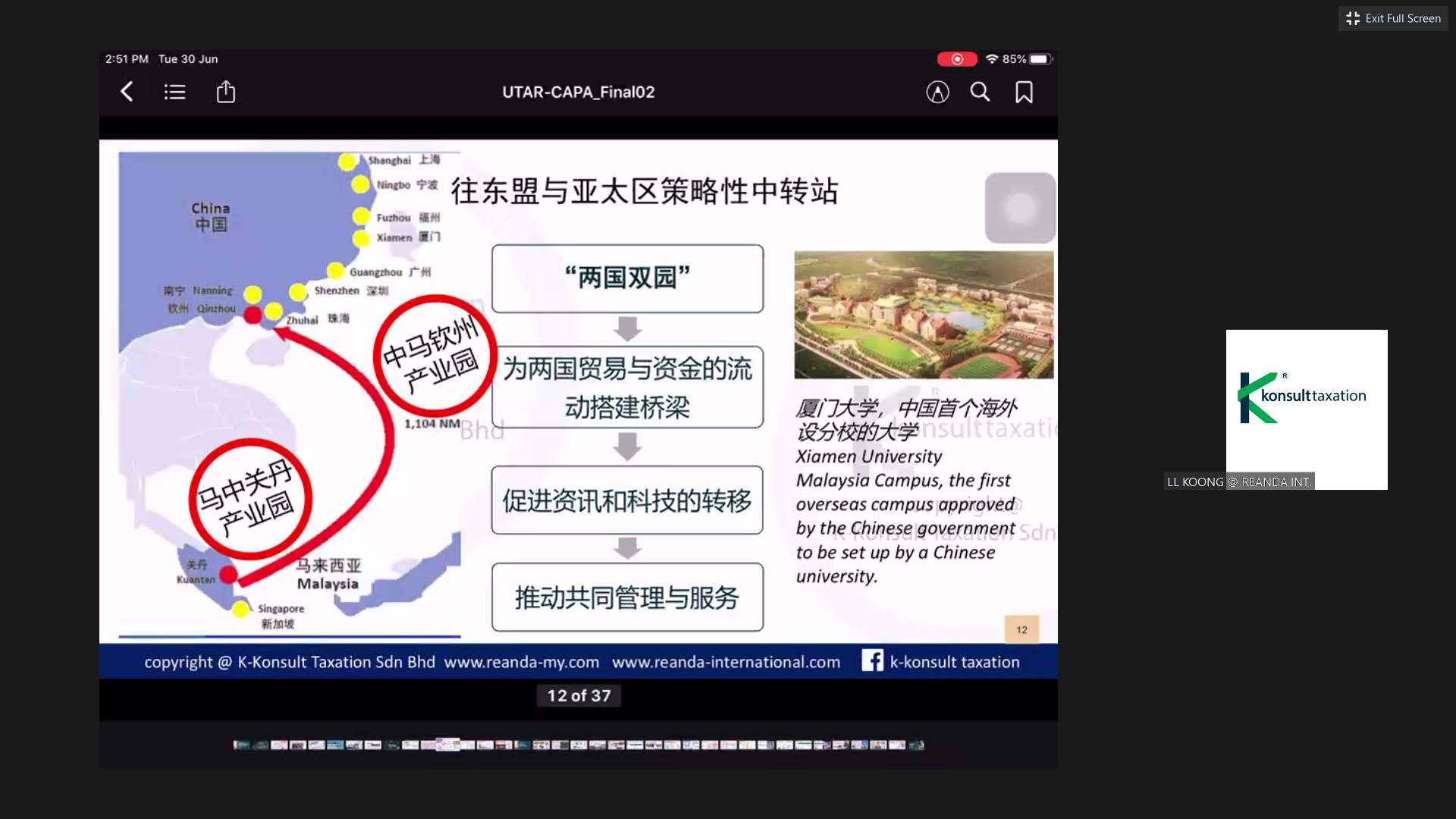
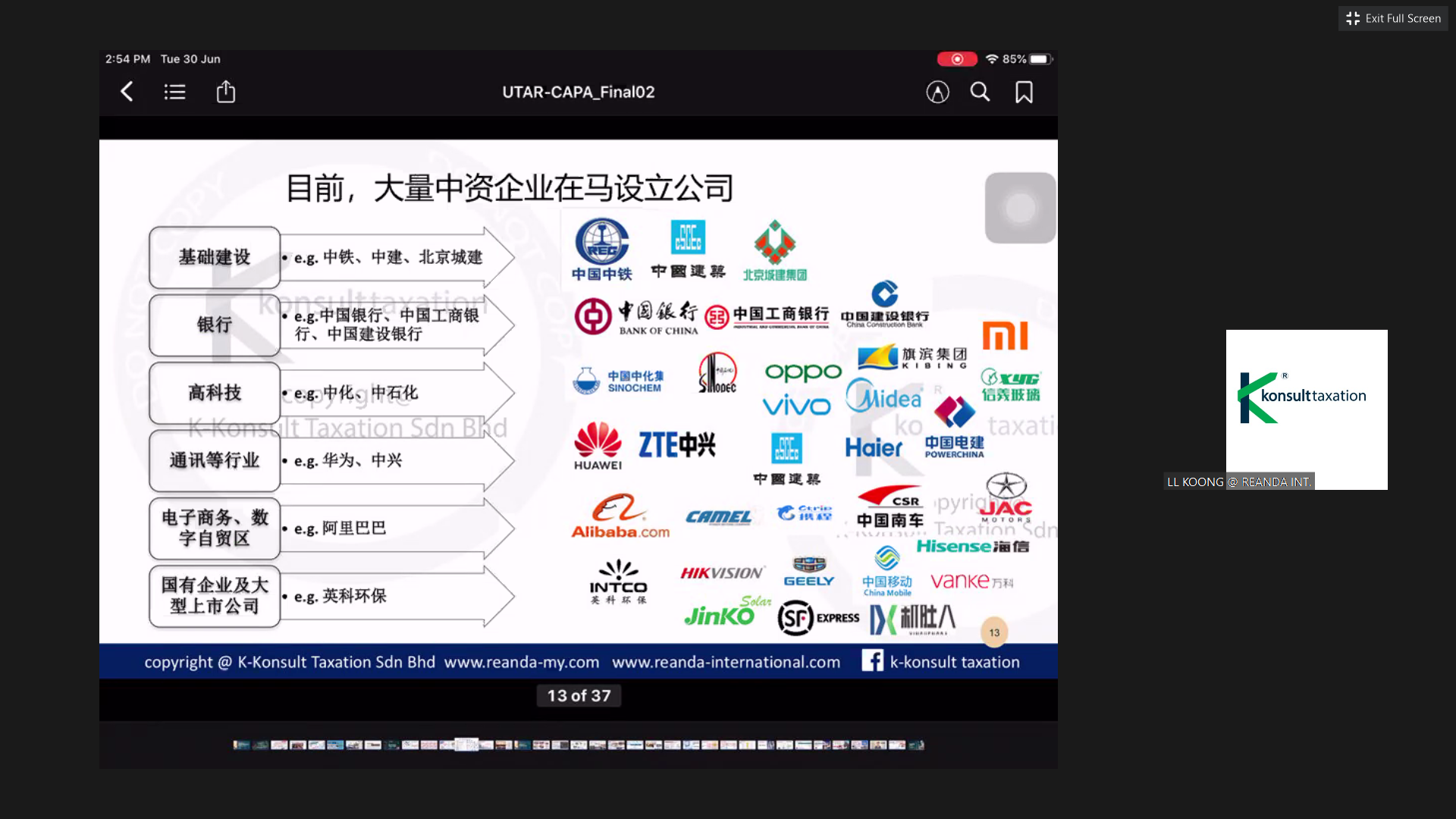
Kong sharing the list of 500 biggest cooperation in China that have invested in Malaysia
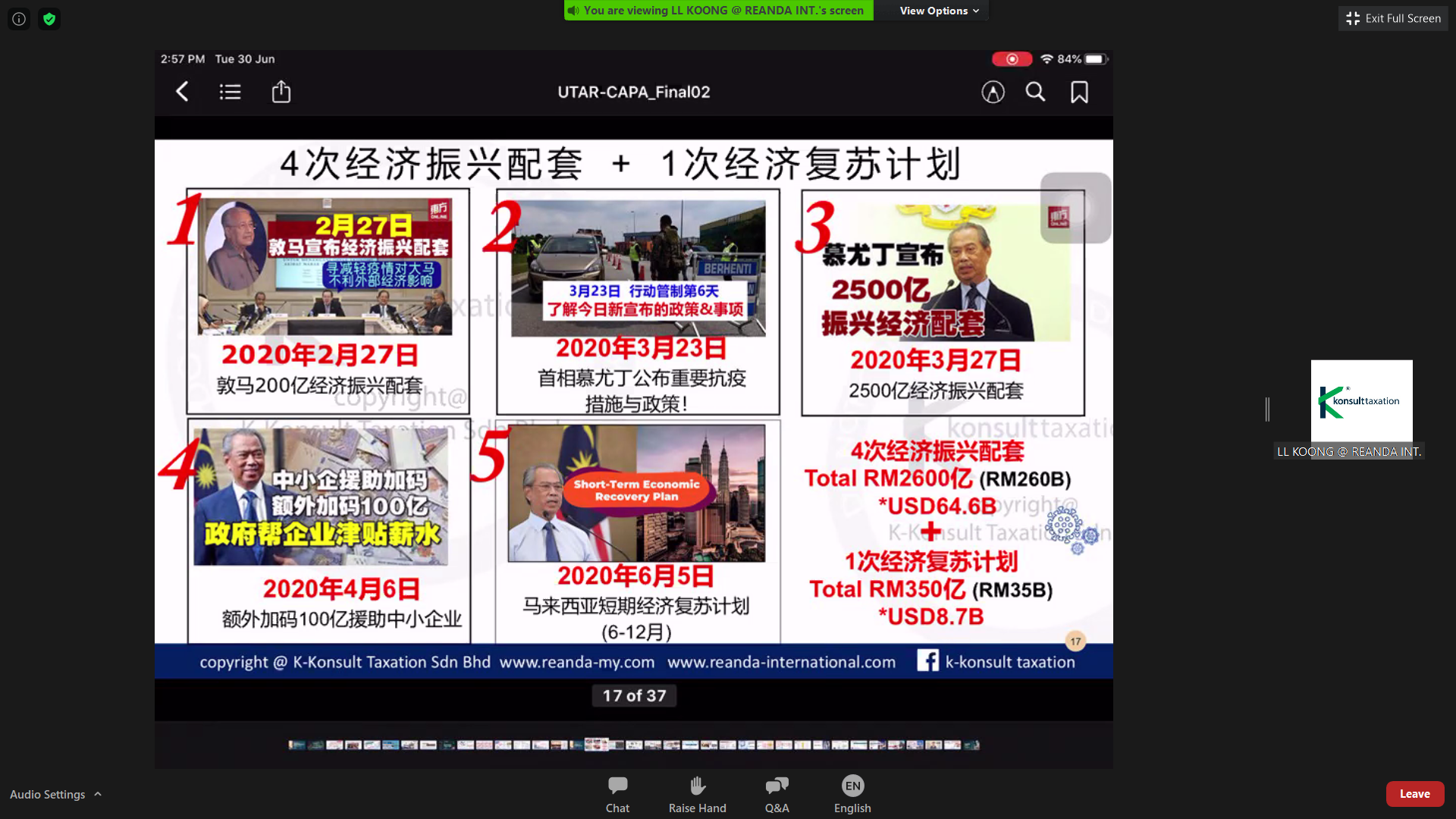
During the MCO period, the Malaysian government came
up with four economic stimulus packages totalling RM260billion and one
economy recovery plan totalling RM358billion to boost the economy
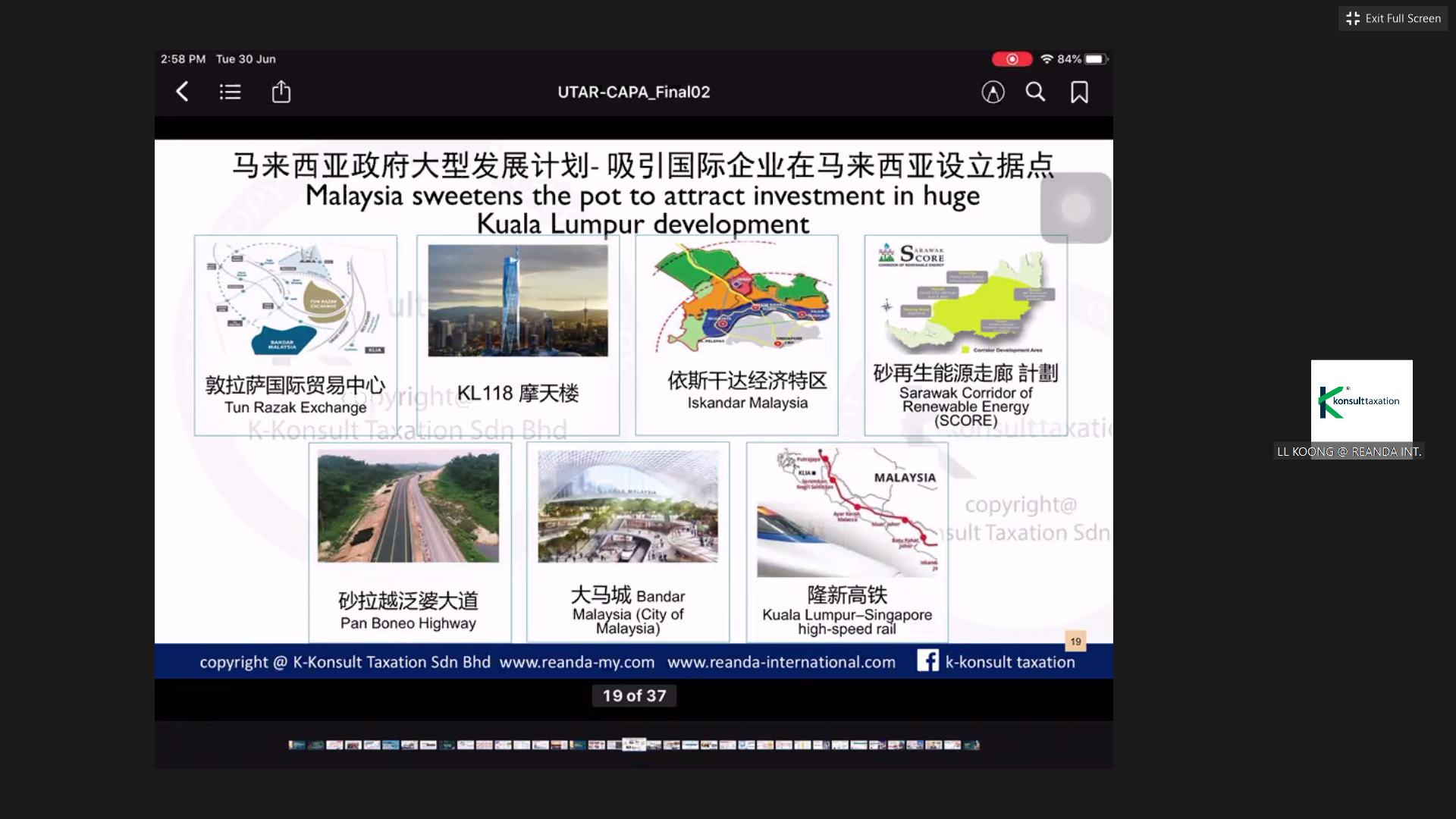
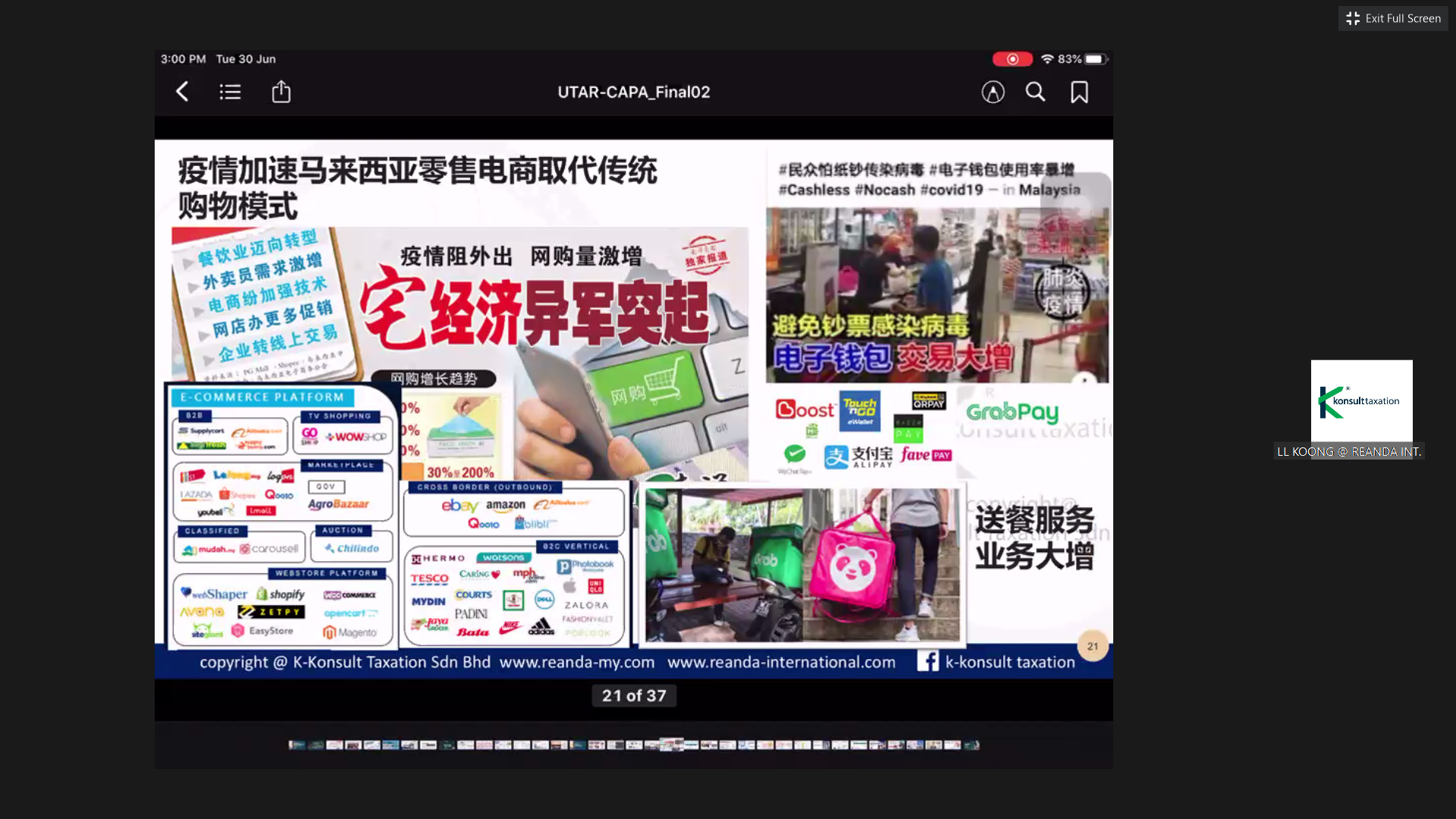
E-wallet is now growing in
Malaysia
Kong
explained, “E-wallet may have taken five to ten years to expand in Malaysia
but because of COVID-19 pendemic, Malaysia has caught up with e-wallet. It
has become a trend these days due to its convenience and hygiene purpose. In
my opinion, China investors should consider E-wallet opportunity in Malaysia
and invest in it.”
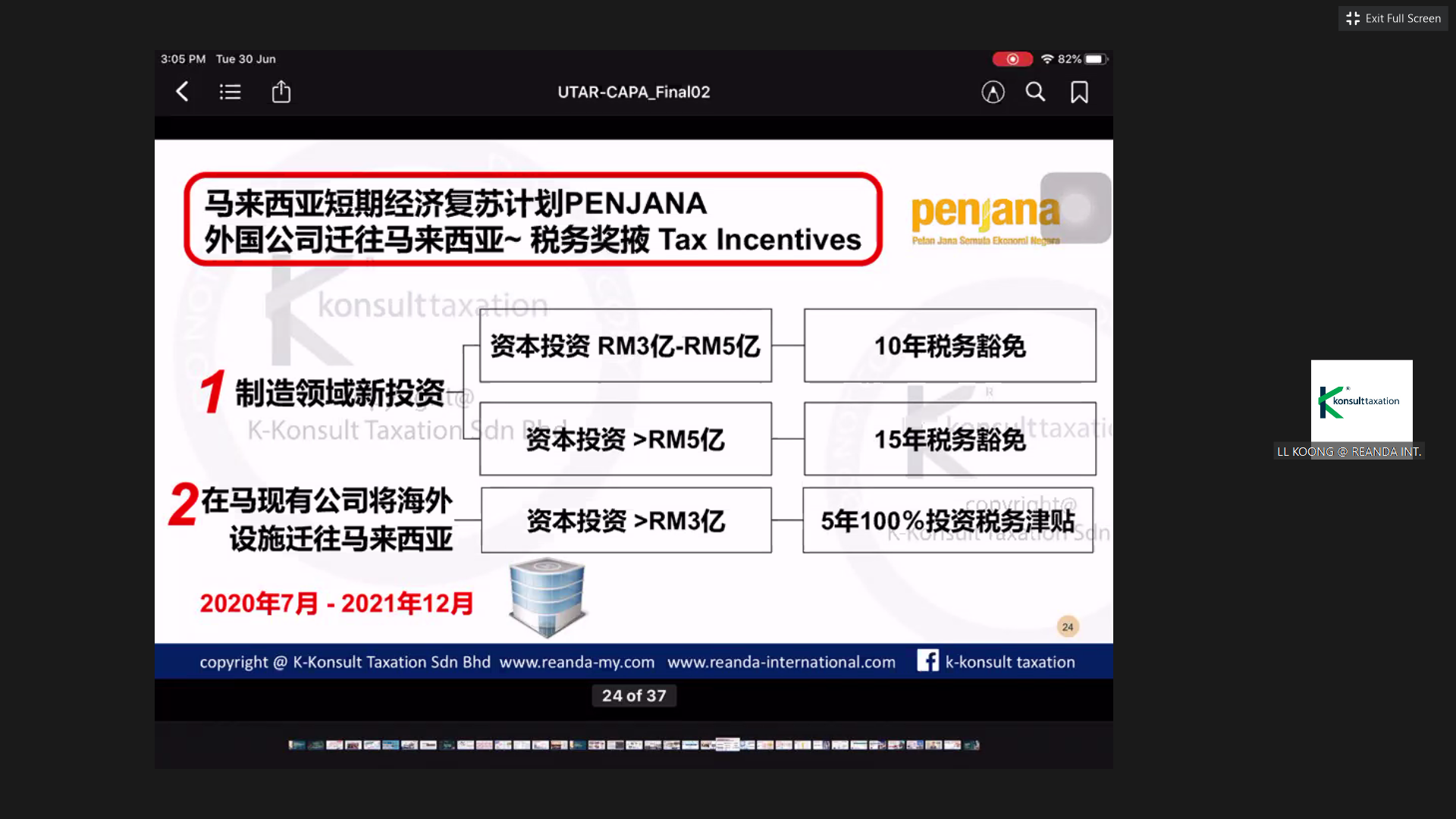
Malaysia came up
with Tax incentives known as PENJANA for the benefit of investors
Kong said, “The Malaysian
government gives license for new investment by offering tax incentives for
the companies. For example, when a foreign company invest RM300million to
RM500million in Malaysia, they can enjoy zero tax incentive for up to ten
years. And if the company invests more than RM500million, they can enjoy
tax-free holiday up to 15 years. And with this 15 years of tax-free holiday,
the investors are allowed to take back their profit to their home country.”
Towards the end of the session,
Kong concluded that the best time to invest in Malaysia is now which is
post-COVID 19. The World Bank foresees that Malaysia will become a
high-income nation in the next ten years. Malaysia is equipped with the most
modern infrastructure, first world standard medical service and etcetera.
The cost to form a company in Malaysia is lower compared to other countries
in ASEAN and the property price is also attractive for international
investors. Besides, investors will not face any language barriers when they
invest in Malaysia as Malaysia is multiracial and multilingual.
The webinar was followed by a Q&A
session between the speakers and participants.
CABA, a non-profit and
non-governmental organisation, is a business promotion group that
coordinates the communications between chambers of commerce, industrial
associations, trade institutions and enterprises within China and ASEAN,
under the framework of China-ASEAN Free Trade Area to promote the trade and
investment cooperation in this region.
The full video of the webinar is
uploaded on “China-ASEAN Business Association” Facebook page. Please click
https://www.facebook.com/Official.CABA/videos/270245701077997/?v=270245701077997
if you are interested to watch the full video.
To read CABA-UTAR Webinar series
on “Post-Covid Economy: Thoughts on what China and ASEAN can learn from each
other”, please click
https://news.utar.edu.my/news/2020/July/01/02/02.html
![]()
![]()
![]()
Wholly owned by UTAR Education Foundation Co. No. 578227-M LEGAL STATEMENT TERM OF USAGE PRIVACY NOTICE